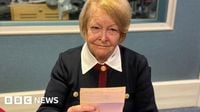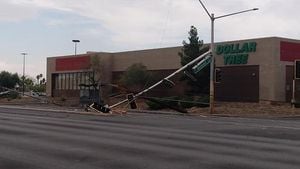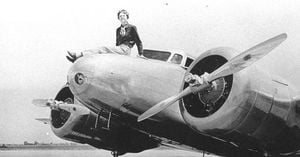To mark the 80th anniversary of the end of World War Two in Europe, commemorative events took place across Canada and the UK, highlighting the sacrifices made during the conflict and celebrating the liberation that followed. In the UK, Penny Lythgoe shared a poignant letter from her aunt, written on Victory in Europe Day, which she discovered among family documents in an attic.
Penny Lythgoe, who was born near the end of World War Two in England, recounted her family's evacuation from Guernsey as she reflected on the letter dated May 8, 1945. "It was a shock but it was so lovely to have the opportunity to understand how my family felt at the end of the war," she said. This letter, one of the few that survived the war, conveyed the emotions of a family awaiting freedom after years of occupation.
The letter, headed 'Peace Day', began with the words, "My dear darlings, at last I am able to write you a real underlined letter. At last we are free and easy, but up to 09:00 this morning we were not." It vividly captured the moment of liberation and the joy that followed, stating, "Tomorrow we get our Red Cross parcels, they are very welcome." This letter serves as a reminder of the scarce communication during the war, where families were lucky to receive even a few words through Red Cross messages.
Meanwhile, in Canada, ceremonies were held to honor the sacrifices made during the war, with veterans, diplomats, and political leaders coming together to remember the end of the conflict. Fraser McKee, a 100-year-old veteran, participated in a wreath-laying ceremony in Toronto and emphasized the importance of remembering those who went to war. "Nearly every family knows somebody who suffered from the effect of war," he noted.
On May 5, 1945, Canadian and Allied soldiers accepted the surrender of German forces in the Netherlands, leading to the declaration of May 8 as Victory in Europe Day. Chief of the Defence Staff Gen. Jennie Carignan spoke at the National War Memorial in Ottawa, stating that the day marks the end of a conflict that cost Canada dearly but also brought it closer to its allies. She remarked, "Row upon row of Canadian war graves bear witness to this enormous sacrifice, a sacrifice met with lasting gratitude that has not faded with time, but instead blossomed into some of our strongest friendships."
Margriet Vonno, the Dutch Ambassador to Canada, highlighted the historical significance of the sacrifices made by Canadians during the liberation of the Netherlands. "We remember the war vividly. The brutality of the Nazi occupation, the hunger," she said, adding that 7,600 Canadians are buried in cemeteries across the Netherlands. This acknowledgment underscores the deep ties between the two nations forged in the crucible of war.
At the cenotaph in Ottawa, ceremonies featured speeches and musical performances, including songs that resonated during the Second World War. Retired corporal Matthew Carson, who served in Europe during the Cold War, expressed hope that the events would remind Canadians of the importance of preventing future wars. "It probably instilled a little vigour in people's memories, to know what we have and what we're fighting for," he said.
Toronto Mayor Olivia Chow, who laid a wreath at the Victory-Peace Monument, reiterated the importance of honoring veterans and active service members. "It's a sacred duty to never forget the sacrifices of veterans and active service members. We owe them a debt of gratitude that can never be fully repaid," she stated.
The letter from Lythgoe's aunt serves as a microcosm of the broader historical narrative, encapsulating the emotions of countless families who lived through the war. It is a reminder of the human stories behind the statistics of war, the longings for freedom, and the joy of reunion.
As Canada and the UK reflect on the 80th anniversary of VE Day, it becomes clear that the memories of sacrifice and bravery are not just historical footnotes, but living legacies that continue to shape national identities and international relationships. The ceremonies across Canada and the sharing of personal stories, like that of Lythgoe, highlight the ongoing impact of the Second World War on contemporary society.
In remembering the past, both nations reaffirm their commitment to peace and the importance of understanding history to prevent the horrors of war from repeating. As the world observes this significant anniversary, the stories of bravery, sacrifice, and liberation remain ever relevant, urging future generations to cherish and protect the freedoms won at such a great cost.




